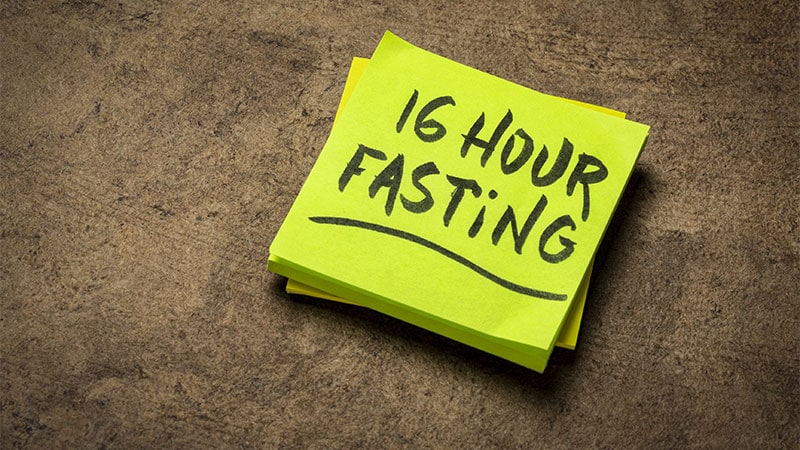BOSTON – Intermittent fasting is an effective alternative to calorie restriction for shedding extra pounds, according to a new study of people with type 2 diabetes.
For the study, 57 overweight and obese participants with type 2 diabetes were randomly assigned to three different groups: the first group ate only between noon and 8 PM, the second was asked to reduce caloric intake by 25% of their maintenance calories, and the third, a control group, continued eating as normal.
The calorie-restriction group tracked their intake on MyFitnessPal, an app that logs the calorie content of different foods. Both the intermittent-fasting and calorie-restriction groups were assigned a dietitian to help with adherence.
After 6 months, participants in the intermittent-fasting group lost about 4.3% of their body weight — the equivalent of 10 pounds of weight loss for a person weighing 230 pounds — whereas participants in the calorie-restriction group lost about 2.5% of their body weight.
The difference between the two groups was not significant, so one approach isn’t necessarily better than the other for weight loss.
“Let’s not think of this as an approach that’s better than calorie restriction,” William Yancy, MD, MHS, an internist and weight management specialist at Duke Lifestyle and Weight Management Center, Durham, North Carolina, told Medscape Medical News. “It’s an alternative approach to calorie restriction.”
Participants’ willingness to adhere to the diet likely accounted for the percentage difference between the groups, study author Vasiliki Pavlou, RDN, told Medscape Medical News. Pavlou presented the findings on July 24 at the Nutrition 2023 conference.
“People that have type 2 diabetes, they’ve already been to the doctor, they’ve already been told to count calories,” said Pavlou, a doctoral student at the University of Illinois Chicago. “There were many weeks where they came to us with nothing on MyFitnessPal and we’d have to encourage them to start tracking again.”
The intermittent-fasting group adhered to the eating time window 6 out of 7 days of the week, with a 1-hour grace period for the noon to 8 PM window. In comparison, one third of the calorie-restriction group didn’t stay within 200 calories of the goal, according to Pavlou.
That meant the fasting group cut about 100 calories more per day than the calorie-restriction group, which was reflected in their weight loss, Pavlou said.
A1c levels dropped by about 1% in both the intermittent-fasting and calorie-restriction groups — a meaningful decrease, said Yancy. “I think a 0.5% difference would have some clinical significance in terms of complications from diabetes,” he said. “So 1% would be even more clinically meaningful.”
However, fewer participants taking insulin in the calorie-restriction group could explain the difference, according to Pavlou. “Usually, when someone goes on insulin, their pancreas is already not functioning as well,” Pavlou said. “And it’s way harder to see improvements in their A1c and glycemic control.”
Up to 90% of people with type 2 diabetes are overweight or obese. Weight loss is one of the major components of type 2 diabetes care, according to the American Diabetes Association, and studies have shown that even a 5% reduction in body weight can reduce blood glucose concentration and A1c. Some studies suggest diabetes remission can occur after a 10% loss in body weight, but Yancy said it depends on the person.
“It depends on the individual, their metabolic situation, how long they’ve had diabetes, what kind of approach they’re following, maybe what medicines they’re taking,” Yancy said. “There’s a lot of different factors involved in remission.”
The study cohort generally had advanced diabetes and was taking a mix of medications, so the results might not be applicable to people with a more recent diabetes diagnosis, according to Pavlou.
Yancy said intermittent fasting could work well for the right person. The success of the approach could depend on a person’s eating habits and whether their meals usually fall outside the time-restricted window, or it could depend on how well a person follows rules, according to Yancy.
“Some people might not eat much after 8 o’clock, and some people might skip breakfast,” Yancy said. “And if that’s the case, then it’s not going to make a big impact on their weight probably.”
Medication is also an important consideration. Not eating can be dangerous for patients taking short-acting insulin or sulfonylureas, according to Yancy.
Pavlou said these findings show intermittent fasting is another option for patients with type 2 diabetes trying to lose weight. “If you’ve tried calorie counting, that’s not working for you or if you’re kind of burnt out, this is something else that you could try,” she said.
“We have a lot of patients that need to lose weight, and we have patients who respond differently to different approaches,” said Yancy. “So having various approaches is really valuable.”
The manuscript is currently under review at JAMA Internal Medicine, said Pavlou.
NUTRITION 2023. Presented July 24, 2023.
For more diabetes and endocrinology news, follow us on Twitter and Facebook.
Source: Read Full Article
